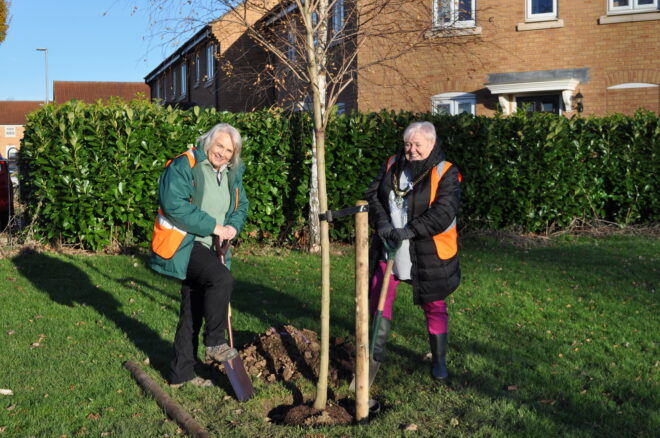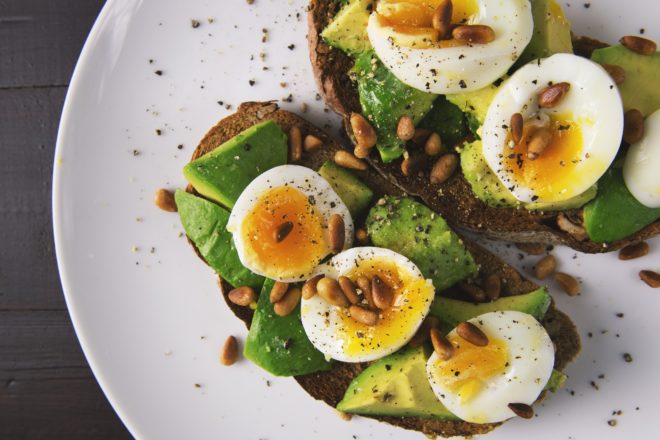
Clinic News
What a great month!!
Firstly our heartfelt thanks to all the brave souls who endured that cold but sunny day last Saturday. Donned in wellies, they came with enthusiasm and yielding spades to help us plant the trees and bulbs. There were over 50 participants digging the field to secure some of the trees and plant 1000 daffodil bulbs - We really can't believe we planted them all in that hour-and-a-half time slot. We suspect it was the promise of hot drinks and cake waiting once complete which created the momentum.
“The greatest gift you can give someone is your time, because when you give your time, you are giving a portion of your life that you will never get back.” Anonymous
Photos ****
Our trees will now need time to mature and flourish, grow strong and provide our environment with essence way beyond when most of us will be here.
The rest of the trees will be planted over the course of the next few weeks within the copse but meanwhile, we wait to witness the fruits of our labour in the Spring - what a carpet of colour those daffodils will be - let's hope we can share that spectacle in a future edition of the newsletter.
Earlier last month the team travelled to Birmingham to the British Chiropractic Association conference where they enjoyed a huge array of seminars and presentations which provided enrichment to their work.
See below a short comment from Julie and Nat about their Operation Excellence Seminar. The fun day was concluded with a wonderful evening of awards, good food and live music.
As temperatures start to fall - check out our winter advice in this month's issue

Operation Excellence
Julie said "We started with an exercise asking "Do we really listen to what people are saying to us?" It taught me to listen more carefully, with more empathy and to try not to interrupt.
We also discussed the impact of marketing, encouraging reviews and the best way to respond to e-mails etc.
There were some interesting ideas on how to deal with patients who don’t attend their appointments, coping with the questioning of advanced payments and the importance of charging fees for missed appointments. Then how to use a traffic light system to implement these procedures. "
Nat said" In the workshop, we discussed the best way to handle complaints in the most professional way, how to always listen to the patient and relay back to them what they have said to show we are listening. Not to interrupt them or talk over them, show empathy and remain calm. Ask the right questions to understand the problem better and help resolve the complaint as best as possible; always logging the details onto the patient's file for future reference.
We also discussed how to connect with patients through Facebook and social media posts - ensuring we target our audience whom we are hoping to connect with the most appropriate information"

Weather Changes and Chronic Back Pain
Temperatures are changing as the colder seasons approach. Those who suffer with chronic back pain might notice that their condition aggravates as temperatures or seasons change. Although there’s not much scientific evidence to prove a link between chronic pain and humidity, temperature changes and wind speed, weather changes can certainly affect those who suffer with joint pain conditions, especially arthritis and osteoarthritis.
The most commonly accepted reasoning is that with colder temperatures comes lower air pressure, which can cause joint tissues to expand and further worsen joints already prone to swelling and tenderness.
If cold weather worsens your pain, you can take these three simple steps to combat it.
- Heat Therapy
Including heat therapy in your daily routine can help to reduce stiffness and boost healing through increased blood circulation. Try applying a warm towel or a heating pad to your painful area for about 20 minutes for temporary pain relief. You can also opt for over-the-counter heat wraps.
- Water Therapy
If you like swimming, try to visit heated indoor pools with hot baths, Jacuzzis and saunas a few times a week for almost instant pain relief.
- Stay Active
As tempting as it is to lounge on the sofa during winter evenings, it is crucial to keep your spine mobile and stay active. If your pain is too severe to go to the gym, try long walks with hiking poles or a Pilates routine at home.
However, if your pain stops you from leading a normal life, the best option is to visit your doctor and professionally address the root causes of joint and back pain.

Staying Healthy, Safe and Fit During Winter
With shorter days and colder weather, finding the motivation to stay healthy and fit can be difficult. And that can lay the foundation for a weakened immune system, posing a greater risk of developing illness or injury. No wonder they call it the winter blues! Here are some easy tips on exercise, diet, health and wellness that you can follow during the cold season.
Start a Keto diet
The ketogenic diet (or keto diet, for short) is a low-carb, high-fat diet that offers many health benefits. In fact, over 20 studies[1] show that this type of diet can help you lose weight and improve your health. It involves drastically reducing carbohydrate intake and replacing it with fat. This reduction in carbs puts your body into a metabolic state called ketosis.
When this happens, your body becomes incredibly efficient at burning fat for energy. It also turns fat into ketones in the liver, which can supply energy for the brain. Ketogenic diets can cause massive reductions in blood sugar and insulin levels. This, along with the increased ketones, has numerous health benefits. Ketogenic diets may even have benefits against diabetes, cancer, epilepsy and Alzheimer’s disease.
Add Omega 3 fatty acids
Omega 3 fatty acids are a healthy type of fat that are naturally found in many food types including fish, plant seeds and nuts. Omega 3 fatty acids are great for reducing joint pain and stiffness as they are a natural anti-inflammatory”. Studies[2] have also shown that omega 3 fatty acids help lower levels of depression, which people commonly feel during the shorter, darker days of winter.
Cook with Spices and Spice Related Foods
Onions, garlic, ginger and turmeric are the perfect items to add flavour to your dishes. Not only do they make food taste great, but they’re also shown to help improve immune function. Fresh garlic, ginger and onions are more than flavouring. Using all three together has a synergistic effect on lowering cholesterol and blood pressure. Turmeric is a spice traditionally used in Chinese and Indian medicine. This spice helps to combat a number of conditions including inflammation and heart disease, and it also acts as a powerful antioxidant.
Plan your Workouts
If you don’t feel in the mood for fitness, you can do exercises at home. There are plenty of resources online that supply workout videos and exercises. These resources offer a variety of workouts including yoga, strength training, aerobics and other body-weight exercises. But try to stick to a weekly exercise plan so you don’t put off your regular exercise activities. On Sunday night, write down your exercise schedule for the next seven days. Choose your exact workout routines, activities or exercises for each day and how long they will be. Knowing what you’re scheduled to do each day ahead of time makes it easier to stick to.
Head to a Steam Room or a Sauna
If you begin to feel yourself experiencing depression or higher levels of stress after the holiday season, steam rooms and saunas can help. They help tense muscles to relax, which can alleviate feelings of stress. The high temperatures also get you working up a sweat, which is a great way to detoxify your body and your skin.
Frequent Hand Washing and Vitamin C
Frequent hand washing throughout the day and consuming lots of vitamin C are an absolute must in maintaining your health during the winter.
Not only do they help protect your immune system and prevent you from developing flu and colds, they also protect others around you.

How to Beat Winter Exhaustion?
The nights are still long, temperatures have plummeted and flu season is very much upon us. From shorter days with less sunlight, changes in hormones and potential nutritional deficiencies, there are so many factors that can contribute to feeling of exhaustion at this time of the year. But here are a few simple ways to put the spring back into your step!
Move more, yawn less
Regular low-intensity workouts help boost energy levels in people suffering from fatigue. In a study, subjects trying low-intensity exercise, like leisurely walking or bike riding, reported the biggest drop in feelings of fatigue compared to the group doing more intense exercise. You should keep moving and ensure you continue exercising regularly, as the endorphins released during activity will help give you a much-needed lift. Regular exercising should also help you achieve a better night’s sleep so you feel more energised in the morning.
Multiple studies have shown that regular exercise strengthens your immune system, so it can fight off bacterial and viral infections. When you exercise and get your blood pumping, immune cells circulate through your body more quickly, helping them to seek and destroy infections. This boost only lasts for a few hours, which is why it’s good to exercise consistently.
Let the light in
February is the worst month for sleep. Research found that it takes longer to nod off in February than any other month. This can certainly be a contributing factor towards people reporting lower energy levels in February than any other month of the year. Aim to go to sleep and wake up at the same hour every day, so you get a good length of rest. Avoid sleeping too much at the weekends, because it might result in you actually feeling even more tired and sluggish.
Check your room temperature, too. If it is too high, it can make you feel like you didn’t get enough sleep, even when you have slept a proper amount of hours. And if it’s too cold you might wake up several times during the night. Sleep experts recommend bedroom temperatures to be between 20-22C degrees. Even if you are sleeping well, you may experience fatigue as a result of increased levels of melatonin, because of lack of exposure to sunlight. To help regulate your melatonin levels, spend as much time outdoors in daylight as you can – take a walk at lunchtime, or make sure the blinds are open if you sit near a window at work.
Boost from within
For most of us, the colder it gets, the more we crave carbs. It’s true that if we’re shivering, we burn more energy to keep warm, but as we spend most of our time in heated environments, most of us don’t need the extra calories. Comforting drinks and foods are often higher in fat, carbohydrates, and added sugars, and they can have a detrimental impact on energy levels, which can end up making you feel worse. Swap in healthier alternatives, like sweet potato, lentils, veggie soups and porridge. It’s also important to include a vitamin D supplement in your diet as our bodies are unable to create enough at this time of year. Food sources such as eggs, oily fish, spreads and fortified cereals are helpful to include in your diet, but a good quality vitamin D3 supplement is more effective. Nutritional deficiencies can cause low energy levels and exhaustion.
https://www.sciencedaily.com/releases/2008/02/080228112008.htm https://www.health.harvard.edu/staying-healthy/how-to-boost-your-immune-system https://medlineplus.gov/ency/article/007165.htmhttps://www.pri.org/stories/2013-02-07/february-worst-month-sleep-study-says
We treat all conditions that affect any muscle or joint in your body, from your head to your little toe! One of the most common complaints that we treat is back pain and Chiropractic is recommended by the government authority, the National Institute for Clinical Excellence (NICE) for acute and chronic back pain. Some of the other conditions that we treat are neck and headache, shoulder pain, leg and hip pain, knee and foot pain, sciatica and arthritis. Our registered Chiropractors all have at least five years of training. Treatment costs can be covered through most health insurers. If you are in any doubt, we are always very happy to talk with you on the phone to see if your condition will respond well to Chiropractic treatment. Call the clinic now to arrange an appointment time that works for you. 0115 9225085 If you would like to opt-out of receiving these newsletters please follow the unsubscribe link below, email alex@beestonchiropractic.co.uk or let us know at your next appointment.





